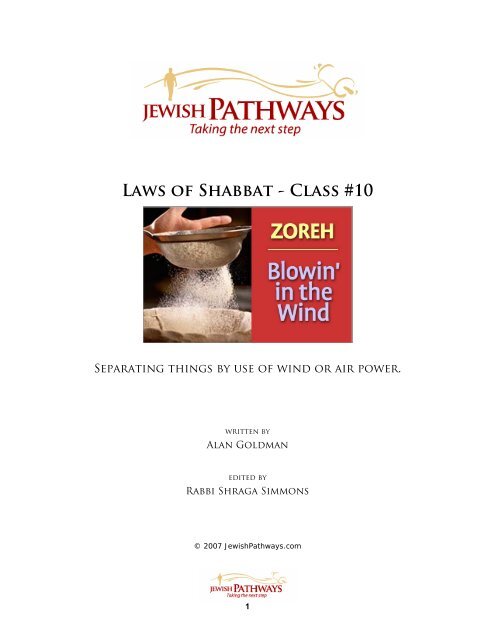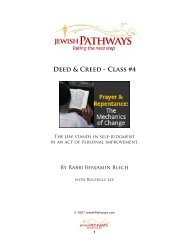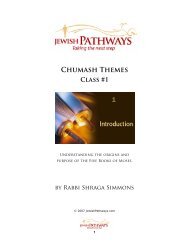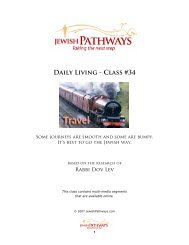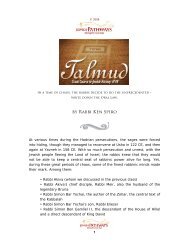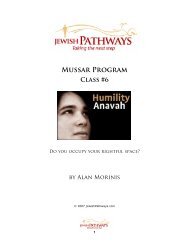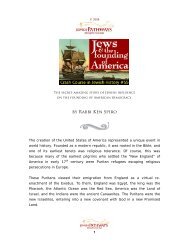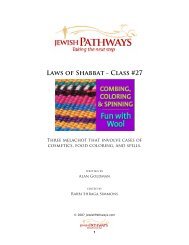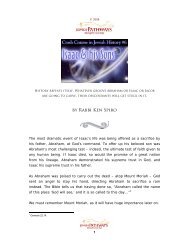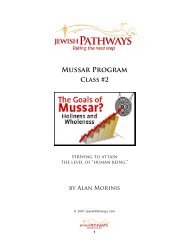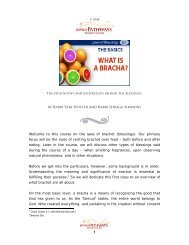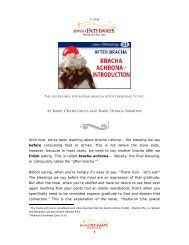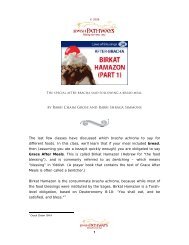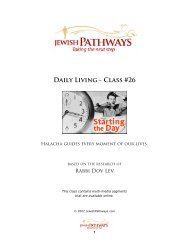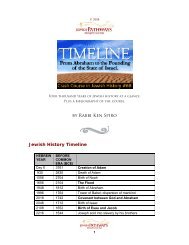Laws of Shabbat - Class #10 - JewishPathways.com
Laws of Shabbat - Class #10 - JewishPathways.com
Laws of Shabbat - Class #10 - JewishPathways.com
Create successful ePaper yourself
Turn your PDF publications into a flip-book with our unique Google optimized e-Paper software.
<strong>Laws</strong> <strong>of</strong> <strong>Shabbat</strong> - <strong>Class</strong> <strong>#10</strong><br />
Separating things by use <strong>of</strong> wind or air power.<br />
written by<br />
Alan Goldman<br />
edited by<br />
Rabbi Shraga Simmons<br />
© 2007 <strong>JewishPathways</strong>.<strong>com</strong><br />
1
We’ve spent a lot <strong>of</strong> time dealing with the labor category <strong>of</strong> Dosh. Now<br />
we’ll turn to a new melacha, called ‘Zoreh’. 1<br />
Zoreh Then and Now<br />
‘Zoreh’ literally means “winnowing” – that is, a further separation <strong>of</strong><br />
the wheat kernel from inedible parts <strong>of</strong> the plant. (This process was<br />
begun by threshing, which we read about in Dosh, part #1.) To<br />
winnow, a person would toss the threshed wheat into the air, and the<br />
lighter, unusable parts (the “chaff”) would get blown <strong>of</strong>f by the wind.<br />
Zoreh is the first <strong>of</strong> three melachot that deal with separating parts <strong>of</strong> a<br />
mixture. (The other two – which we’ll examine soon, G-d willing – are<br />
Borer and Meraked.) Even back in the Talmud, the Sages wondered<br />
why we have three labor categories that deal with essentially the same<br />
activity.<br />
One answer is that, although all <strong>of</strong> these melachot lead to a similar<br />
result, the separating is ac<strong>com</strong>plished by different means. So, as we’ll<br />
see<br />
• Zoreh involves separating through wind or air power 2<br />
• Borer involves separating by hand<br />
• Meraked involves separating via a strainer or similar tool. 3<br />
As it turns out, there aren’t that many practical applications <strong>of</strong> this<br />
melacha. Let’s examine some <strong>of</strong> them.<br />
1 Pronounced ‘zoh-REH.’<br />
2 Some include “the scattering <strong>of</strong> anything into the air” under the heading <strong>of</strong> Zoreh (see Jerusalem<br />
Talmud - <strong>Shabbat</strong> ch. 7; 39 Melochos, p. 375).<br />
3 See 39 Melochos, p. 375, for a discussion <strong>of</strong> this issue, based on Talmud - <strong>Shabbat</strong> 73b.<br />
2
In Practice<br />
Beyond the actual winnowing <strong>of</strong> grain, what other activities would be<br />
covered by Zoreh?<br />
Examples would be blowing the seeds <strong>of</strong>f a dandelion, or throwing<br />
confetti into the air. Similarly, one would not be allowed to shake<br />
crumbs <strong>of</strong>f a tablecloth out the window, as this would probably cause<br />
the crumbs to be blown by the wind.<br />
One contemporary author suggests that the list should also include<br />
blowing dust <strong>of</strong>f a book; blowing excess sugar <strong>of</strong>f a cookie or other<br />
pastry; shaking dust from a blanket; and similar things. 4<br />
A seemingly logical extension <strong>of</strong><br />
Zoreh would be using an<br />
aerosol spray (ozone issues<br />
aside), since this appears to<br />
work by using air power to<br />
project material outwards. In<br />
fact, however, aerosols work by<br />
using pressure, not air.<br />
Therefore, it is acceptable to<br />
use them. 5<br />
4 Based on Magen Avraham 446:2, Rabbeinu Chananel – <strong>Shabbat</strong> 74; 39 Melochos, p. 376.<br />
5 39 Melochos, p. 377-8; Halachos <strong>of</strong> Shabbos, IX:D.6 (p. 131) as heard from Rabbi Moshe<br />
Feinstein.<br />
3
A Further Issue<br />
Okay, you may be thinking, what if there’s no wind? Would it then be<br />
permissible to do the activities we’ve been discussing?<br />
The halacha says that you should avoid Zoreh activities even if at that<br />
moment there is no wind or a very light wind, since wind is<br />
unpredictable (i.e. you don’t know if a strong wind is about to <strong>com</strong>e<br />
along). 6<br />
In Closing<br />
Zoreh has a limited number <strong>of</strong> practical applications, but conceptually<br />
it’s an important link in the chain <strong>of</strong> activities <strong>com</strong>prising ‘the Order <strong>of</strong><br />
Bread’.<br />
We now move on to Borer (Sorting), one <strong>of</strong> the most fascinating and<br />
detailed <strong>of</strong> all <strong>of</strong> the melachot.<br />
6 See Iglei Tal, Borer 4.<br />
4


